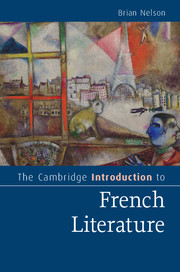Book contents
- Frontmatter
- Dedication
- Contents
- Preface
- Acknowledgements
- Chronology
- 1 Villon: a dying man
- 2 Rabelais: the uses of laughter
- 3 Montaigne: self-portrait
- 4 Corneille: heroes and kings
- 5 Racine: in the labyrinth
- 6 Molière: new forms of comedy
- 7 La Fontaine: the power of fables/fables of power
- 8 Madame de Lafayette: the birth of the modern novel
- 9 Voltaire: the case for tolerance
- 10 Rousseau: man of feeling
- 11 Diderot: the enlightened sceptic
- 12 Laclos: dangerous liaisons
- 13 Stendhal: the pursuit of happiness
- 14 Balzac: ‘All is true’
- 15 Hugo: the divine stenographer
- 16 Baudelaire: the streets of Paris
- 17 Flaubert: the narrator vanishes
- 18 Zola: the poetry of the real
- 19 Huysmans: against nature
- 20 Mallarmé: the magic of words
- 21 Rimbaud: somebody else
- 22 Proust: the self, time and art
- 23 Jarry: the art of provocation
- 24 Apollinaire: impresario of the new
- 25 Breton … Company: Surrealism
- 26 Céline: night journey
- 27 Sartre: writing in the world
- 28 Camus: a moral voice
- 29 Beckett: filling the silence
- 30 French literature into the twenty-first century
- Notes
- Further reading
- Index of authors and titles
- Index of genres, movements and concepts
- Cambridge Introductions to …
- References
4 - Corneille: heroes and kings
Published online by Cambridge University Press: 05 July 2015
- Frontmatter
- Dedication
- Contents
- Preface
- Acknowledgements
- Chronology
- 1 Villon: a dying man
- 2 Rabelais: the uses of laughter
- 3 Montaigne: self-portrait
- 4 Corneille: heroes and kings
- 5 Racine: in the labyrinth
- 6 Molière: new forms of comedy
- 7 La Fontaine: the power of fables/fables of power
- 8 Madame de Lafayette: the birth of the modern novel
- 9 Voltaire: the case for tolerance
- 10 Rousseau: man of feeling
- 11 Diderot: the enlightened sceptic
- 12 Laclos: dangerous liaisons
- 13 Stendhal: the pursuit of happiness
- 14 Balzac: ‘All is true’
- 15 Hugo: the divine stenographer
- 16 Baudelaire: the streets of Paris
- 17 Flaubert: the narrator vanishes
- 18 Zola: the poetry of the real
- 19 Huysmans: against nature
- 20 Mallarmé: the magic of words
- 21 Rimbaud: somebody else
- 22 Proust: the self, time and art
- 23 Jarry: the art of provocation
- 24 Apollinaire: impresario of the new
- 25 Breton … Company: Surrealism
- 26 Céline: night journey
- 27 Sartre: writing in the world
- 28 Camus: a moral voice
- 29 Beckett: filling the silence
- 30 French literature into the twenty-first century
- Notes
- Further reading
- Index of authors and titles
- Index of genres, movements and concepts
- Cambridge Introductions to …
- References
Summary
Do your duty, and leave the rest to the gods
– Corneille, HoraceIn April 1655 the young Louis XIV made a speech to the parlement of Paris in which he was reputed to have used the phrase ‘L’État, c'est moi' (I am the State). It was during Louis's long reign (1643–1715) that France moved decisively towards a centralized, ‘absolutist’ form of government. A key figure in this process was Cardinal Richelieu (1585–1642), chief minister to Louis XIII. Richelieu's central aim was unity under the Crown – a prerequisite, in his view, for prosperity. The turbulent feudal nobility was not finally quelled, however, until the victory of the monarchy in the ‘Fronde’, the organized resistance to monarchical authority which developed into civil war in the early 1650s. This movement towards the reinforcement of royal authority is the vital background to the plays of Pierre Corneille (1606–84), in which questions of government become increasingly the focus of interest. At the heart of Corneille's theatre is a concern with power relations. His most celebrated plays – Le Cid (1637), Horace (1640), Cinna (1641) and Polyeucte (1642) – dramatize the tensions between the individual subject and the institutions of state.
Le Cid
Le Cid is generally regarded as the most significant play in the history of French theatre. Set in medieval Spain at a time of transition between feudal custom and royal power, its dramatic conflict centres on two young lovers, Rodrigo and Chimène. The drama is initiated when the father of Chimène, Don Gomez, insults the father of Rodrigo, Don Diego. The two old nobles, representing a disappearing generation, feel bound to uphold their ‘gloire’: that is, their reputation and status, in the eyes of their peers, as honourable men. Don Diego commands his son to seek revenge. In Act I, Scene 6, Rodrigo is seen confronting his tragic dilemma.
- Type
- Chapter
- Information
- The Cambridge Introduction to French Literature , pp. 25 - 31Publisher: Cambridge University PressPrint publication year: 2015

